- How we help you
The UK Hauliers Brexit Transition Deadline Survey
With days to go until the deadline, how many haulage companies are ready for the transition date on 31st December and what does the industry still need to do?
Tristan Bacon — Updated

With days to go until the deadline, how many haulage companies are ready for the transition date on 31st December and what does the industry still need to do? As the UK’s premium freight exchange platform, we thought we would find out.
We asked the owners of 32 exporting UK haulage companies for insights into how Brexit has affected – and will affect – their businesses, and what they need in order to be sufficiently prepared for the changes.
The EU and UK’s haulage industries are deeply connected. With nearly 1 in 4 UK hauliers having already lost business due to Brexit, professionals from across the industry reveal whether they are prepared for what’s next.
Key findings:
- 72% believe they will be negatively impacted by customs changes after 1st January 2021
- 13% believe that they will be positively impacted
- 75% expect to be impacted by increased waiting times at the border
- 66% expect increased time spent in admin in preparation to cross the border
- 50% anticipate higher tariffs imposed on goods
- 44% expect less access to European goods
- 84% of haulage companies want greater clarity from the government around customs changes
- 62% of haulage companies feel that they need to be more prepared for changes to customs checks when exporting and importing goods to the EU, and 28% of these companies are ‘not at all’ prepared
- 47% feel they need more time to make the legislation changes and get the required admin in order
- 22% require additional financial support to implement new software technology
- Just under 1 in every 8 haulage companies (12%) believe they are prepared for customs changes
Which changes will have the biggest impact from 1st January 2021?
Talk of delays and tailbacks at the border has dominated news coverage of Brexit negotiations for several years, and it seems people working in the logistics industry share exactly the same concerns. Increased waiting times at the border (75%) and more time spent on pre-crossing admin (66%) are the changes that most people expect to have an impact day-to-day.
- Increased waiting time at the border – 75%
- Increased time spent in admin in preparation to cross the border – 66%
- Higher tariffs imposed on goods – 50%
- Less access to European goods – 44%
- Changing licensing and registration requirements – 41%
- Less access to European staff – 25%
- We don’t believe we’ll be impacted – 6%
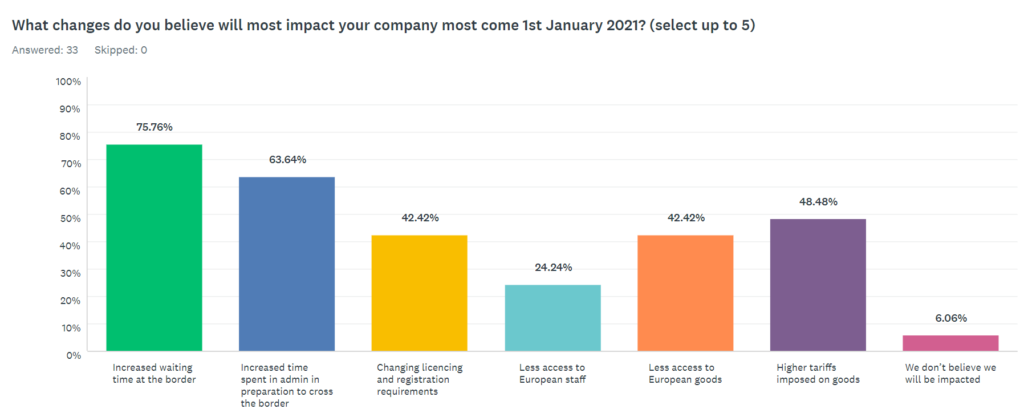
Half of respondents expect to be impacted the most by higher tariffs imposed on goods, while just 6% do not believe that they will be impacted by Brexit at all. Will customs changes still affect businesses after the transition period?
Customs remains a huge sticking point for most people in the industry. A significant majority (72%) of haulage companies believe that they will be negatively impacted by customs changes following the end of the transition period.
62% feel that they need to be more prepared for changes to customs checks when exporting and importing goods to and from the EU, and of these, 28% are ‘not at all’ prepared.
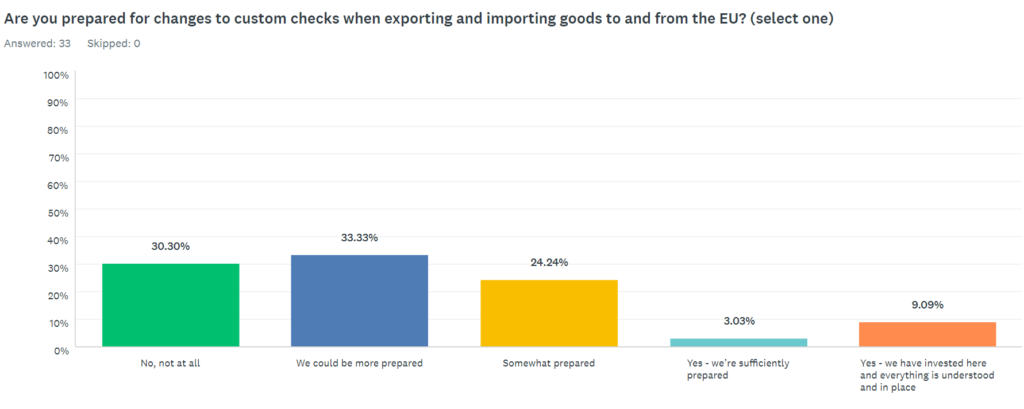
How prepared are businesses for customs changes?
Uncertainty across haulage businesses continues to be a problem as the end of the transition period approaches – just 12% of respondents are sufficiently prepared, thanks to 9% of these having invested heavily to make sure they understand the customs changes.
When it comes to completing Safety and Security Declarations, only 13% of haulage respondents have trained their hauliers and couriers to fill them in themselves. Another 13% will have staff filling them in on behalf of hauliers, and 9% have implemented software which can fill them in automatically.
What do companies want ahead of the deadline date?
Clear guidance is by far the biggest thing missing from the Brexit transition process where most hauliers are concerned. 84% want more clarity on changes to border legislation, while almost half (47%) want more time to get the necessary admin done.
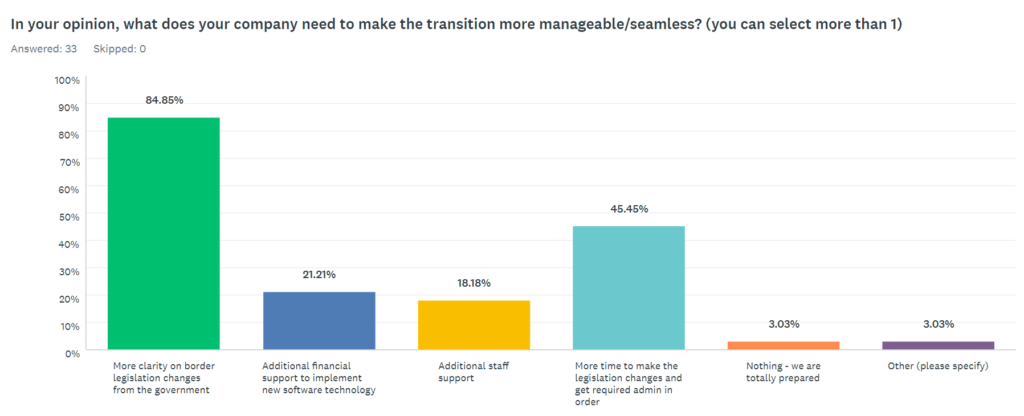
Perhaps the biggest indication of all as to where things stand, with just days to go before the transition period ends, is the fact that only 3% of hauliers surveyed believe they are totally prepared and don’t need anything. Additional findings: Have opinions towards Brexit changed since the 2016 referendum vote?
The years between the 2016 vote and the day of departing the EU has allowed for many to reflect on whether their opinions have changed. A significant proportion of hauliers would stick to their decision to remain – 1 in 3 hauliers say they voted remain and would do so again. Despite concerns about the transition being held by the majority of hauliers, 16% say they voted leave and would vote leave again.
- 33% voted remain and would vote remain again
- 16% voted leave and would vote leave again
- 19% did not vote but would now vote remain
- 12% voted leave but would now vote remain
- 0% voted remain but would now vote leave
- 0% did not vote but would now vote leave
- 3% did not vote and still would not vote
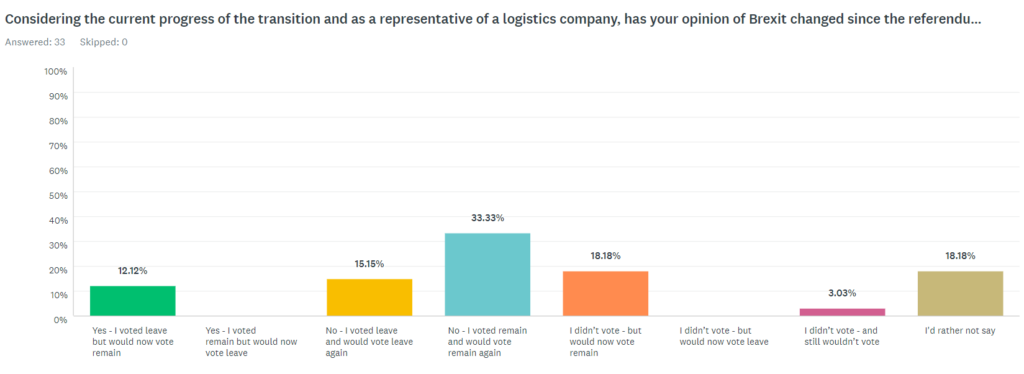
Additional findings: What changes for logistics businesses have been caused by Brexit?
It is clear that Brexit has made an impact on logistics businesses, with around 1 in 5 hauliers stating that they have lost business, and 15% say they have had to make redundancies. 9% of hauliers have increased their staff numbers, whilst 15% have seen an increase in demand.
- 21% have lost business
- 15% have had to make redundancies
- 9% have increased staff members
- 15% have seen an increase in demand
- 6% are no longer working with EU-based companies
- 40% say nothing has changed
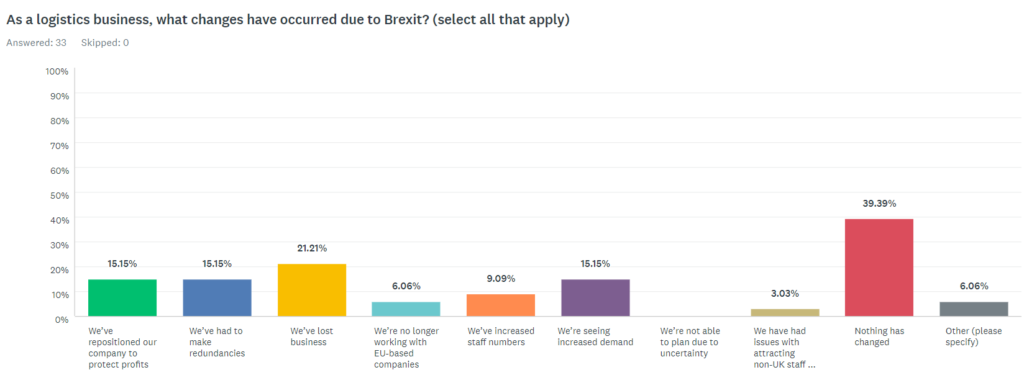
Sam Wilkinson, Chief Revenue Officer at Transport Exchange Group, says:
“With the upcoming Brexit transition deadline, our focus is to ensure users of our market-leading Freight Exchange platforms, Courier Exchange and Haulage Exchange, can continue to carry goods to and from the EU without disruption.
According to our survey, delays at ports and paperwork are front of mind for carriers. To ensure they can be prepared and avoid delays we are working with industry experts to provide educational content that will be signposted directly from within our platform.
Post-transition period, freight will continue to move and Transport Exchange Group will continue to lead the way for UK Freight Exchange platforms.”
Add-ons
Resources
Support
About
2000 - 2025. Transport Exchange Group Ltd, Reg No. 3464353 © E&OE